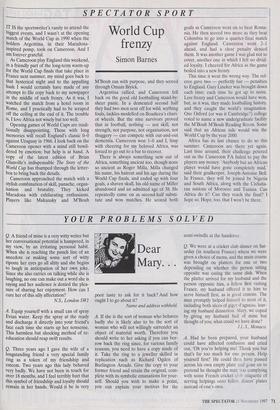SPECTATOR SPORT
World Cup frenzy
Simon Barnes
IT IS the sportswriter's vanity to attend the biggest events, and I wasn't at the opening match of the World Cup in 1990 when the holders Argentina, in their Maradona- inspired pomp, took on Cameroon. And I am forever grateful.
As Cameroon play England this weekend, in a friendly part of the long-term warm-up for the World Cup finals that take place in France next summer, my mind goes back to that hysterical night and to the appalling hash I would certainly have made of any attempt to file copy back to my newspaper in the middle of such frenzy. As it was, I watched the match from a hotel room in Rome, and I practically had to be scraped off the ceiling at the end of it. The trouble is, I love Africa not wisely but too well.
Opening games of World Cups are tradi- tionally disappointing. Those with long memories will recall England's classic 0-0 against Uruguay in 1966. I look back on the Cameroon opener with a mind still bewil- dered by emotion; but help is at hand. A copy of the latest edition of Brian Glanville's indispensable The Story of the World Cup has thumped through the letter- box to bring back the details.
Cameroon approached the match with a stylish combination of skill, panache, organ- isation and brutality. They kicked Maradona with exhilarating enthusiasm. Players like Makanaky and M'Bouh M'Bouh ran with purpose, and they scored through Omam Biyick.
Argentina rallied, and Cameroon fell back on the good old footballing stand-by: sheer panic. In a demented second half they had two men sent off for wild, scything fouls, tackles modelled on Boadicea's chari- ot wheels. But the nine survivors proved that in football, nothing — not skill, not strength, not purpose, not organisation, not thuggery — can compete with out-and-out dementia. Cameroon won 1-0 and I, limp with cheering for my beloved Africa, was forced to go out to a bar to recover.
There is always something new out of Africa, something ancient too, though none so ancient as Roger Milla. Milla changed his name, his haircut and his age during the World Cup finals, and ended up with four goals, a shaven skull, his old name of Miller abandoned and an admitted age of 38. He repeatedly came on as second-half substi- tute and won matches. He scored both goals as Cameroon went on to beat Roma- nia. He then scored two more as they beat Colombia to go into a quarter-final match against England. Cameroon went 2-1 ahead, and had a clear penalty denied them. It was another game I was glad not to cover, another one in which I felt no divid- ed loyalty. I cheered for Africa as the game boiled into a new frenzy.
This time it went the wrong way. The ref- eree gave two — perfectly fair — penalties to England. Gary Lineker was brought down each time; each time he got up to score. Less frenzy and Cameroon would have won, but, as it was, they made footballing history, and they caught the world's imagination. One Oxford (or was it Cambridge?) college voted to name a new undergraduate facility the M'Bouh M'Bouh Reading Room. Some said that an African side would win the World Cup by the year 2000.
Africa has its last chance to do so this summer. Cameroon are there yet again. Last time around, their challenge petered out as the Cameroon FA failed to pay the players any money. 'Anybody but an African player would have gone completely mad,' said their goalkeeper, Joseph-Antoine Bell. In France, they will be joined by Nigeria and South Africa, along with the CisSaha- ran nations of Morocco and Tunisia. Can Africa do it? Can they reach the final? I hope so. Hope, too, that I won't be there.










































































 Previous page
Previous page